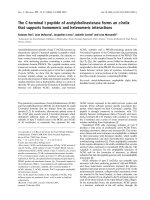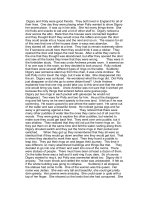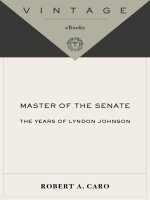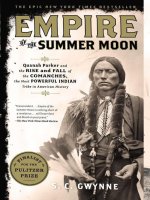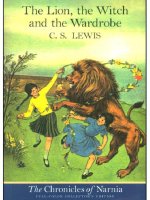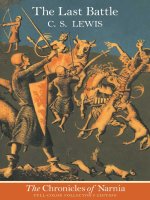C s lewis CHRONICLES OF NARNIA CHRONOLOGICAL ORDER 02 the lion, the witch and the wa obe (v5 0)
Bạn đang xem bản rút gọn của tài liệu. Xem và tải ngay bản đầy đủ của tài liệu tại đây (4.86 MB, 111 trang )
The Chronicles of Narnia
C. S. LEWIS
BOOK TWO
The Lion, the Witch
and the Wardrobe
ILLUSTRATED IN COLOR
BY PAULINE BAYNES
TO LUCY BARFIELD
My Dear Lucy,
I wrote this story for you, but when I began it I had not realized that girls grow quicker than books. As a result you are
already too old for fairy tales, and by the time it is printed and bound you will be older still. But some day you will be old
enough to start reading fairy tales again. You can then take it down from some upper shelf, dust it, and tell me what you think
of it. I shall probably be too deaf to hear, and too old to understand, a word you say, but I shall still be
your affectionate Godfather,
C. S. Lewis
Map
Contents
Cover
Title Page
Dedication
Map
ONE: LUCY LOOKS INTO A WARDROBE
TWO: WHAT LUCY FOUND THERE
THREE: EDMUND AND THE WARDROBE
FOUR: TURKISH DELIGHT
FIVE: BACK ON THIS SIDE OF THE DOOR
SIX: INTO THE FOREST
SEVEN: A DAY WITH THE BEAVERS
EIGHT: WHAT HAPPENED AFTER DINNER
NINE: IN THE WITCH’S HOUSE
TEN: THE SPELL BEGINS TO BREAK
ELEVEN: ASLAN IS NEARER
TWELVE: PETER’S FIRST BATTLE
THIRTEEN: DEEP MAGIC FROM THE DAWN OF TIME
FOURTEEN: THE TRIUMPH OF THE WITCH
FIFTEEN: DEEPER MAGIC FROM BEFORE THE DAWN OF TIME
SIXTEEN: WHAT HAPPENED ABOUT THE STATUES
SEVENTEEN: THE HUNTING OF THE WHITE STAG
The Chronicles of Narnia
Copyright
About the Publisher
ONE
LUCY LOOKS INTO
A WARDROBE
ONCE THERE WERE FOUR CHILDREN whose names were Peter, Susan, Edmund and
Lucy. This story is about something that happened to them when they were sent away
from London during the war because of the air-raids. They were sent to the house of an
old Professor who lived in the heart of the country, ten miles from the nearest railway
station and two miles from the nearest post o ce. He had no wife and he lived in a
very large house with a housekeeper called Mrs. Macready and three servants. (Their
names were Ivy, Margaret and Betty, but they do not come into the story much.) He
himself was a very old man with shaggy white hair which grew over most of his face as
well as on his head, and they liked him almost at once; but on the rst evening when he
came out to meet them at the front door he was so odd-looking that Lucy (who was the
youngest) was a little afraid of him, and Edmund (who was the next youngest) wanted
to laugh and had to keep on pretending he was blowing his nose to hide it.
As soon as they had said good night to the Professor and gone upstairs on the rst
night, the boys came into the girls’ room and they all talked it over.
“We’ve fallen on our feet and no mistake,” said Peter. “This is going to be perfectly
splendid. That old chap will let us do anything we like.”
“I think he’s an old dear,” said Susan.
“Oh, come o it!” said Edmund, who was tired and pretending not to be tired, which
always made him bad-tempered. “Don’t go on talking like that.”
“Like what?” said Susan; “and anyway, it’s time you were in bed.”
“Trying to talk like Mother,” said Edmund. “And who are you to say when I’m to go to
bed? Go to bed yourself.”
“Hadn’t we all better go to bed?” said Lucy. “There’s sure to be a row if we’re heard
talking here.”
“No, there won’t,” said Peter. “I tell you this is the sort of house where no one’s going
to mind what we do. Anyway, they won’t hear us. It’s about ten minutes’ walk from here
down to that dining room, and any amount of stairs and passages in between.”
“What’s that noise?” said Lucy suddenly. It was a far larger house than she had ever
been in before and the thought of all those long passages and rows of doors leading into
empty rooms was beginning to make her feel a little creepy.
“It’s only a bird, silly,” said Edmund.
“It’s an owl,” said Peter. “This is going to be a wonderful place for birds. I shall go to
bed now. I say, let’s go and explore tomorrow. You might nd anything in a place like
this. Did you see those mountains as we came along? And the woods? There might be
eagles. There might be stags. There’ll be hawks.”
“Badgers!” said Lucy.
“Foxes!” said Edmund.
“Rabbits!” said Susan.
But when next morning came there was a steady rain falling, so thick that when you
looked out of the window you could see neither the mountains nor the woods nor even
the stream in the garden.
“Of course it would be raining!” said Edmund. They had just nished their breakfast
with the Professor and were upstairs in the room he had set apart for them—a long, low
room with two windows looking out in one direction and two in another.
“Do stop grumbling, Ed,” said Susan. “Ten to one it’ll clear up in an hour or so. And in
the meantime we’re pretty well off. There’s a wireless and lots of books.”
“Not for me,” said Peter; “I’m going to explore in the house.”
Everyone agreed to this and that was how the adventures began. It was the sort of
house that you never seem to come to the end of, and it was full of unexpected places.
The rst few doors they tried led only into spare bedrooms, as everyone had expected
that they would; but soon they came to a very long room full of pictures and there they
found a suit of armor; and after that was a room all hung with green, with a harp in one
corner; and then came three steps down and ve steps up, and then a kind of little
upstairs hall and a door that led out onto a balcony, and then a whole series of rooms
that led into each other and were lined with books—most of them very old books and
some bigger than a Bible in a church. And shortly after that they looked into a room that
was quite empty except for one big wardrobe; the sort that has a looking-glass in the
door. There was nothing else in the room at all except a dead bluebottle on the windowsill.
“Nothing there!” said Peter, and they all trooped out again—all except Lucy. She
stayed behind because she thought it would be worth while trying the door of the
wardrobe, even though she felt almost sure that it would be locked. To her surprise it
opened quite easily, and two moth-balls dropped out.
Looking into the inside, she saw several coats hanging up—mostly long fur coats.
There was nothing Lucy liked so much as the smell and feel of fur. She immediately
stepped into the wardrobe and got in among the coats and rubbed her face against
them, leaving the door open, of course, because she knew that it is very foolish to shut
oneself into any wardrobe. Soon she went further in and found that there was a second
row of coats hanging up behind the rst one. It was almost quite dark in there and she
kept her arms stretched out in front of her so as not to bump her face into the back of
the wardrobe. She took a step further in—then two or three steps—always expecting to
feel woodwork against the tips of her fingers. But she could not feel it.
“This must be a simply enormous wardrobe!” thought Lucy, going still further in and
pushing the soft folds of the coats aside to make room for her. Then she noticed that
there was something crunching under her feet. “I wonder is that more moth-balls?” she
thought, stooping down to feel it with her hand. But instead of feeling the hard, smooth
wood of the oor of the wardrobe, she felt something soft and powdery and extremely
cold. “This is very queer,” she said, and went on a step or two further.
Next moment she found that what was rubbing against her face and hands was no
longer soft fur but something hard and rough and even prickly. “Why, it is just like
branches of trees!” exclaimed Lucy. And then she saw that there was a light ahead of
her; not a few inches away where the back of the wardrobe ought to have been, but a
long way o . Something cold and soft was falling on her. A moment later she found that
she was standing in the middle of a wood at night-time with snow under her feet and
snowflakes falling through the air.
Lucy felt a little frightened, but she felt very inquisitive and excited as well. She
looked back over her shoulder and there, between the dark tree-trunks, she could still
see the open doorway of the wardrobe and even catch a glimpse of the empty room
from which she had set out. (She had, of course, left the door open, for she knew that it
is a very silly thing to shut oneself into a wardrobe.) It seemed to be still daylight there.
“I can always get back if anything goes wrong,” thought Lucy. She began to walk
forward, crunch-crunch over the snow and through the wood toward the other light. In
about ten minutes she reached it and found it was a lamp-post. As she stood looking at
it, wondering why there was a lamp-post in the middle of a wood and wondering what
to do next, she heard a pitter patter of feet coming toward her. And soon after that a
very strange person stepped out from among the trees into the light of the lamp-post.
He was only a little taller than Lucy herself and he carried over his head an umbrella,
white with snow. From the waist upward he was like a man, but his legs were shaped
like a goat’s (the hair on them was glossy black) and instead of feet he had goat’s hoofs.
He also had a tail, but Lucy did not notice this at rst because it was neatly caught up
over the arm that held the umbrella so as to keep it from trailing in the snow. He had a
red woollen mu er round his neck and his skin was rather reddish too. He had a
strange, but pleasant little face, with a short pointed beard and curly hair, and out of
the hair there stuck two horns, one on each side of his forehead. One of his hands, as I
have said, held the umbrella: in the other arm he carried several brown-paper parcels.
What with the parcels and the snow it looked just as if he had been doing his Christmas
shopping. He was a Faun. And when he saw Lucy he gave such a start of surprise that he
dropped all his parcels.
“Goodness gracious me!” exclaimed the Faun.
TWO
WHAT LUCY
FOUND THERE
“GOOD EVENING,” SAID LUCY. BUT THE Faun was so busy picking up its parcels that
at first it did not reply. When it had finished it made her a little bow.
“Good evening, good evening,” said the Faun. “Excuse me—I don’t want to be
inquisitive—but should I be right in thinking that you are a Daughter of Eve?”
“My name’s Lucy,” said she, not quite understanding him.
“But you are—forgive me—you are what they call a girl?” asked the Faun.
“Of course I’m a girl,” said Lucy.
“You are in fact Human?”
“Of course I’m human,” said Lucy, still a little puzzled.
“To be sure, to be sure,” said the Faun. “How stupid of me! But I’ve never seen a Son
of Adam or a Daughter of Eve before. I am delighted. That is to say—” and then it
stopped as if it had been going to say something it had not intended but had
remembered in time. “Delighted, delighted,” it went on. “Allow me to introduce myself.
My name is Tumnus.”
“I am very pleased to meet you, Mr. Tumnus,” said Lucy.
“And may I ask, O Lucy Daughter of Eve,” said Mr. Tumnus, “how you have come into
Narnia?”
“Narnia? What’s that?” said Lucy.
“This is the land of Narnia,” said the Faun, “where we are now; all that lies between
the lamppost and the great castle of Cair Paravel on the eastern sea. And you—you
have come from the wild woods of the west?”
“I—I got in through the wardrobe in the spare room,” said Lucy.
“Ah!” said Mr. Tumnus in a rather melancholy voice, “if only I had worked harder at
geography when I was a little Faun, I should no doubt know all about those strange
countries. It is too late now.”
“But they aren’t countries at all,” said Lucy, almost laughing. “It’s only just back there
—at least—I’m not sure. It is summer there.”
“Meanwhile,” said Mr. Tumnus, “it is winter in Narnia, and has been for ever so long,
and we shall both catch cold if we stand here talking in the snow. Daughter of Eve from
the far land of Spare Oom where eternal summer reigns around the bright city of War
Drobe, how would it be if you came and had tea with me?”
“Thank you very much, Mr. Tumnus,” said Lucy. “But I was wondering whether I
ought to be getting back.”
“It’s only just round the corner,” said the Faun, “and there’ll be a roaring
toast—and sardines—and cake.”
“Well, it’s very kind of you,” said Lucy. “But I shan’t be able to stay long.”
re—and
“If you will take my arm, Daughter of Eve,” said Mr. Tumnus, “I shall be able to hold
the umbrella over both of us. That’s the way. Now—off we go.”
And so Lucy found herself walking through the wood arm in arm with this strange
creature as if they had known one another all their lives.
They had not gone far before they came to a place where the ground became rough
and there were rocks all about and little hills up and little hills down. At the bottom of
one small valley Mr. Tumnus turned suddenly aside as if he were going to walk straight
into an unusually large rock, but at the last moment Lucy found he was leading her into
the entrance of a cave. As soon as they were inside she found herself blinking in the
light of a wood re. Then Mr. Tumnus stooped and took a aming piece of wood out of
the re with a neat little pair of tongs, and lit a lamp. “Now we shan’t be long,” he said,
and immediately put a kettle on.
Lucy thought she had never been in a nicer place. It was a little, dry, clean cave of
reddish stone with a carpet on the oor and two little chairs (“one for me and one for a
friend,” said Mr. Tumnus) and a table and a dresser and a mantelpiece over the re and
above that a picture of an old Faun with a gray beard. In one corner there was a door
which Lucy thought must lead to Mr. Tumnus’s bedroom, and on one wall was a shelf
full of books. Lucy looked at these while he was setting out the tea things. They had
titles like The Life and Letters of Silenus or Nymphs and Their Ways or Men, Monks, and
Gamekeepers; a Study in Popular Legend or Is Man a Myth?
“Now, Daughter of Eve!” said the Faun.
And really it was a wonderful tea. There was a nice brown egg, lightly boiled, for
each of them, and then sardines on toast, and then buttered toast, and then toast with
honey, and then a sugar-topped cake. And when Lucy was tired of eating, the Faun
began to talk. He had wonderful tales to tell of life in the forest. He told about the
midnight dances and how the Nymphs who lived in the wells and the Dryads who lived
in the trees came out to dance with the Fauns; about long hunting parties after the milkwhite stag who could give you wishes if you caught him; about feasting and treasureseeking with the wild Red Dwarfs in deep mines and caverns far beneath the forest
oor; and then about summer when the woods were green and old Silenus on his fat
donkey would come to visit them, and sometimes Bacchus himself, and then the streams
would run with wine instead of water and the whole forest would give itself up to
jolli cation for weeks on end. “Not that it isn’t always winter now,” he added gloomily.
Then to cheer himself up he took out from its case on the dresser a strange little ute
that looked as if it were made of straw and began to play. And the tune he played made
Lucy want to cry and laugh and dance and go to sleep all at the same time. It must have
been hours later when she shook herself and said:
“Oh, Mr. Tumnus—I’m so sorry to stop you, and I do love that tune—but really, I must
go home. I only meant to stay for a few minutes.”
“It’s no good now, you know,” said the Faun, laying down its ute and shaking its
head at her very sorrowfully.
“No good?” said Lucy, jumping up and feeling rather frightened. “What do you mean?
I’ve got to go home at once. The others will be wondering what has happened to me.”
But a moment later she asked, “Mr. Tumnus! Whatever is the matter?” for the Faun’s
brown eyes had lled with tears and then the tears began trickling down its cheeks, and
soon they were running o the end of its nose; and at last it covered its face with its
hands and began to howl.
“Mr. Tumnus! Mr. Tumnus!” said Lucy in great distress. “Don’t! Don’t! What is the
matter? Aren’t you well? Dear Mr. Tumnus, do tell me what is wrong.” But the Faun
continued sobbing as if its heart would break. And even when Lucy went over and put
her arms round him and lent him her handkerchief, he did not stop. He merely took the
handkerchief and kept on using it, wringing it out with both hands whenever it got too
wet to be any more use, so that presently Lucy was standing in a damp patch.
“Mr. Tumnus!” bawled Lucy in his ear, shaking him. “Do stop. Stop it at once! You
ought to be ashamed of yourself, a great big Faun like you. What on earth are you
crying about?”
“Oh—oh—oh!” sobbed Mr. Tumnus, “I’m crying because I’m such a bad Faun.”
“I don’t think you’re a bad Faun at all,” said Lucy. “I think you are a very good Faun.
You are the nicest Faun I’ve ever met.”
“Oh—oh—you wouldn’t say that if you knew,” replied Mr. Tumnus between his sobs.
“No, I’m a bad Faun. I don’t suppose there ever was a worse Faun since the beginning of
the world.”
“But what have you done?” asked Lucy.
“My old father, now,” said Mr. Tumnus; “that’s his picture over the mantelpiece. He
would never have done a thing like this.”
“A thing like what?” said Lucy.
“Like what I’ve done,” said the Faun. “Taken service under the White Witch. That’s
what I am. I’m in the pay of the White Witch.”
“The White Witch? Who is she?”
“Why, it is she that has got all Narnia under her thumb. It’s she that makes it always
winter. Always winter and never Christmas; think of that!”
“How awful!” said Lucy. “But what does she pay you for?”
“That’s the worst of it,” said Mr. Tumnus with a deep groan. “I’m a kidnapper for her,
that’s what I am. Look at me, Daughter of Eve. Would you believe that I’m the sort of
Faun to meet a poor innocent child in the wood, one that had never done me any harm,
and pretend to be friendly with it, and invite it home to my cave, all for the sake of
lulling it asleep and then handing it over to the White Witch?”
“No,” said Lucy. “I’m sure you wouldn’t do anything of the sort.”
“But I have,” said the Faun.
“Well,” said Lucy rather slowly (for she wanted to be truthful and yet not be too hard
on him), “well, that was pretty bad. But you’re so sorry for it that I’m sure you will
never do it again.”
“Daughter of Eve, don’t you understand?” said the Faun. “It isn’t something I have
done. I’m doing it now, this very moment.”
“What do you mean?” cried Lucy, turning very white.
“You are the child,” said Tumnus. “I had orders from the White Witch that if ever I
saw a Son of Adam or a Daughter of Eve in the wood, I was to catch them and hand
them over to her. And you are the rst I ever met. And I’ve pretended to be your friend
and asked you to tea, and all the time I’ve been meaning to wait till you were asleep
and then go and tell Her.”
“Oh, but you won’t, Mr. Tumnus,” said Lucy. “You won’t, will you? Indeed, indeed
you really mustn’t.”
“And if I don’t,” said he, beginning to cry again, “she’s sure to nd out. And she’ll
have my tail cut o , and my horns sawn o , and my beard plucked out, and she’ll wave
her wand over my beautiful cloven hoofs and turn them into horrid solid hoofs like a
wretched horse’s. And if she is extra and specially angry she’ll turn me into stone and I
shall be only a statue of a Faun in her horrible house until the four thrones at Cair
Paravel are lled—and goodness knows when that will happen, or whether it will ever
happen at all.”
“I’m very sorry, Mr. Tumnus,” said Lucy. “But please let me go home.”
“Of course I will,” said the Faun. “Of course I’ve got to. I see that now. I hadn’t known
what Humans were like before I met you. Of course I can’t give you up to the Witch; not
now that I know you. But we must be o at once. I’ll see you back to the lamp-post. I
suppose you can find your own way from there back to Spare Oom and War Drobe?”
“I’m sure I can,” said Lucy.
“We must go as quietly as we can,” said Mr. Tumnus. “The whole wood is full of her
spies. Even some of the trees are on her side.”
They both got up and left the tea things on the table, and Mr. Tumnus once more put
up his umbrella and gave Lucy his arm, and they went out into the snow. The journey
back was not at all like the journey to the Faun’s cave; they stole along as quickly as
they could, without speaking a word, and Mr. Tumnus kept to the darkest places. Lucy
was relieved when they reached the lamp-post again.
“Do you know your way from here, Daughter of Eve?” said Tumnus.
Lucy looked very hard between the trees and could just see in the distance a patch of
light that looked like daylight. “Yes,” she said, “I can see the wardrobe door.”
“Then be o home as quick as you can,” said the Faun, “and—c-can you ever forgive
me for what I meant to do?”
“Why, of course I can,” said Lucy, shaking him heartily by the hand. “And I do hope
you won’t get into dreadful trouble on my account.”
“Farewell, Daughter of Eve,” said he. “Perhaps I may keep the handkerchief?”
“Rather!” said Lucy, and then ran toward the far-o patch of daylight as quickly as
her legs would carry her. And presently instead of rough branches brushing past her she
felt coats, and instead of crunching snow under her feet she felt wooden boards, and all
at once she found herself jumping out of the wardrobe into the same empty room from
which the whole adventure had started. She shut the wardrobe door tightly behind her
and looked around, panting for breath. It was still raining and she could hear the voices
of the others in the passage.
“I’m here,” she shouted. “I’m here. I’ve come back, I’m all right.”
THREE
EDMUND AND
THE WARDROBE
LUCY RAN OUT OF THE EMPTY ROOM into the passage and found the other three.
“It’s all right,” she repeated, “I’ve come back.”
“What on earth are you talking about, Lucy?” asked Susan.
“Why,” said Lucy in amazement, “haven’t you all been wondering where I was?”
“So you’ve been hiding, have you?” said Peter. “Poor old Lu, hiding and nobody
noticed! You’ll have to hide longer than that if you want people to start looking for
you.”
“But I’ve been away for hours and hours,” said Lucy.
The others all stared at one another.
“Batty!” said Edmund, tapping his head. “Quite batty.”
“What do you mean, Lu?” asked Peter.
“What I said,” answered Lucy. “It was just after breakfast when I went into the
wardrobe, and I’ve been away for hours and hours, and had tea, and all sorts of things
have happened.”
“Don’t be silly, Lucy,” said Susan. “We’ve only just come out of that room a moment
ago, and you were there then.”
“She’s not being silly at all,” said Peter, “she’s just making up a story for fun, aren’t
you, Lu? And why shouldn’t she?”
“No, Peter, I’m not,” she said. “It’s—it’s a magic wardrobe. There’s a wood inside it,
and it’s snowing, and there’s a Faun and a Witch and it’s called Narnia; come and see.”
The others did not know what to think, but Lucy was so excited that they all went
back with her into the room. She rushed ahead of them, ung open the door of the
wardrobe and cried, “Now! go in and see for yourselves.”
“Why, you goose,” said Susan, putting her head inside and pulling the fur coats apart,
“it’s just an ordinary wardrobe; look! there’s the back of it.”
Then everyone looked in and pulled the coats apart; and they all saw—Lucy herself
saw—a perfectly ordinary wardrobe. There was no wood and no snow, only the back of
the wardrobe, with hooks on it. Peter went in and rapped his knuckles on it to make
sure that it was solid.
“A jolly good hoax, Lu,” he said as he came out again; “you have really taken us in, I
must admit. We half-believed you.”
“But it wasn’t a hoax at all,” said Lucy, “really and truly. It was all di erent a
moment ago. Honestly it was. I promise.”
“Come, Lu,” said Peter, “that’s going a bit far. You’ve had your joke. Hadn’t you
better drop it now?”
Lucy grew very red in the face and tried to say something, though she hardly knew
what she was trying to say, and burst into tears.
For the next few days she was very miserable. She could have made it up with the
others quite easily at any moment if she could have brought herself to say that the whole
thing was only a story made up for fun. But Lucy was a very truthful girl and she knew
that she was really in the right; and she could not bring herself to say this. The others
who thought she was telling a lie, and a silly lie too, made her very unhappy. The two
elder ones did this without meaning to do it, but Edmund could be spiteful, and on this
occasion he was spiteful. He sneered and jeered at Lucy and kept on asking her if she’d
found any other new countries in other cupboards all over the house. What made it
worse was that these days ought to have been delightful. The weather was ne and they
were out of doors from morning to night, bathing, shing, climbing trees, and lying in
the heather. But Lucy could not properly enjoy any of it. And so things went on until the
next wet day.
That day, when it came to the afternoon and there was still no sign of a break in the
weather, they decided to play hide-and-seek. Susan was “It” and as soon as the others
scattered to hide, Lucy went to the room where the wardrobe was. She did not mean to
hide in the wardrobe, because she knew that would only set the others talking again
about the whole wretched business. But she did want to have one more look inside it; for
by this time she was beginning to wonder herself whether Narnia and the Faun had not
been a dream. The house was so large and complicated and full of hiding-places that she
thought she would have time to have one look into the wardrobe and then hide
somewhere else. But as soon as she reached it she heard steps in the passage outside,
and then there was nothing for it but to jump into the wardrobe and hold the door
closed behind her. She did not shut it properly because she knew that it is very silly to
shut oneself into a wardrobe, even if it is not a magic one.
Now the steps she had heard were those of Edmund; and he came into the room just in
time to see Lucy vanishing into the wardrobe. He at once decided to get into it himself—
not because he thought it a particularly good place to hide but because he wanted to go
on teasing her about her imaginary country. He opened the door. There were the coats
hanging up as usual, and a smell of mothballs, and darkness and silence, and no sign of
Lucy. “She thinks I’m Susan come to catch her,” said Edmund to himself, “and so she’s
keeping very quiet in at the back.” He jumped in and shut the door, forgetting what a
very foolish thing this is to do. Then he began feeling about for Lucy in the dark. He had
expected to nd her in a few seconds and was very surprised when he did not. He
decided to open the door again and let in some light. But he could not nd the door
either. He didn’t like this at all and began groping wildly in every direction; he even
shouted out, “Lucy! Lu! Where are you? I know you’re here.”
There was no answer and Edmund noticed that his own voice had a curious sound—
not the sound you expect in a cupboard, but a kind of open-air sound. He also noticed
that he was unexpectedly cold; and then he saw a light.
“Thank goodness,” said Edmund, “the door must have swung open of its own accord.”
He forgot all about Lucy and went toward the light, which he thought was the open door
of the wardrobe. But instead of nding himself stepping out into the spare room he
found himself stepping out from the shadow of some thick dark r trees into an open
place in the middle of a wood.
There was crisp, dry snow under his feet and more snow lying on the branches of the
trees. Overhead there was a pale blue sky, the sort of sky one sees on a ne winter day
in the morning. Straight ahead of him he saw between the tree-trunks the sun, just
rising, very red and clear. Everything was perfectly still, as if he were the only living
creature in that country. There was not even a robin or a squirrel among the trees, and
the wood stretched as far as he could see in every direction. He shivered.
He now remembered that he had been looking for Lucy; and also how unpleasant he
had been to her about her “imaginary country” which now turned out not to have been
imaginary at all. He thought that she must be somewhere quite close and so he shouted,
“Lucy! Lucy! I’m here too—Edmund.”
There was no answer.
“She’s angry about all the things I’ve been saying lately,” thought Edmund. And
though he did not like to admit that he had been wrong, he also did not much like being
alone in this strange, cold, quiet place; so he shouted again.
“I say, Lu! I’m sorry I didn’t believe you. I see now you were right all along. Do come
out. Make it Pax.”
Still there was no answer.
“Just like a girl,” said Edmund to himself, “sulking somewhere, and won’t accept an
apology.” He looked round him again and decided he did not much like this place, and
had almost made up his mind to go home, when he heard, very far o in the wood, a
sound of bells. He listened and the sound came nearer and nearer and at last there
swept into sight a sledge drawn by two reindeer.
The reindeer were about the size of Shetland ponies and their hair was so white that
even the snow hardly looked white compared with them; their branching horns were
gilded and shone like something on re when the sunrise caught them. Their harness
was of scarlet leather and covered with bells. On the sledge, driving the reindeer, sat a
fat dwarf who would have been about three feet high if he had been standing. He was
dressed in polar bear’s fur and on his head he wore a red hood with a long gold tassel
hanging down from its point; his huge beard covered his knees and served him instead
of a rug. But behind him, on a much higher seat in the middle of the sledge sat a very
di erent person—a great lady, taller than any woman that Edmund had ever seen. She
also was covered in white fur up to her throat and held a long straight golden wand in
her right hand and wore a golden crown on her head. Her face was white—not merely
pale, but white like snow or paper or icing-sugar, except for her very red mouth. It was
a beautiful face in other respects, but proud and cold and stern.
The sledge was a ne sight as it came sweeping toward Edmund with the bells
jingling and the dwarf cracking his whip and the snow flying up on each side of it.
“Stop!” said the Lady, and the dwarf pulled the reindeer up so sharp that they almost
sat down. Then they recovered themselves and stood champing their bits and blowing.
In the frosty air the breath coming out of their nostrils looked like smoke.
“And what, pray, are you?” said the Lady, looking hard at Edmund.
“I’m—I’m—my name’s Edmund,” said Edmund rather awkwardly. He did not like the
way she looked at him.
The Lady frowned. “Is that how you address a Queen?” she asked, looking sterner
than ever.
“I beg your pardon, your Majesty, I didn’t know,” said Edmund.
“Not know the Queen of Narnia?” cried she. “Ha! You shall know us better hereafter.
But I repeat—what are you?”
“Please, your Majesty,” said Edmund, “I don’t know what you mean. I’m at school—at
least I was—it’s the holidays now.”
